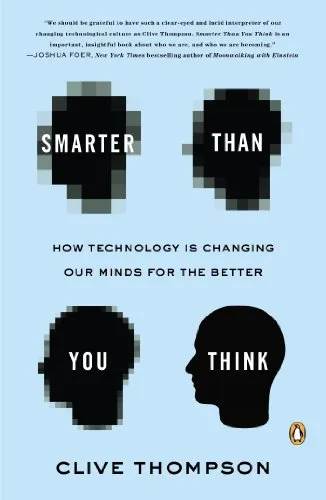Policing and Intelligence in the Global Big Data Era, Volume II: New Global Perspectives on the Politics and Ethics of Knowledge (Palgrave's Critical Policing Studies)
4.0
بر اساس نظر کاربران

شما میتونید سوالاتتون در باره کتاب رو از هوش مصنوعیش بعد از ورود بپرسید
هر دانلود یا پرسش از هوش مصنوعی 2 امتیاز لازم دارد، برای بدست آوردن امتیاز رایگان، به صفحه ی راهنمای امتیازات سر بزنید و یک سری کار ارزشمند انجام بدینکتاب های مرتبط:
معرفی کتاب
کتاب "Policing and Intelligence in the Global Big Data Era, Volume II: New Global Perspectives on the Politics and Ethics of Knowledge" اثری تحلیلی و روشنگرانه است که با دیدگاهی انتقادی، به بررسی نحوه عملکرد پلیس و نهادهای اطلاعاتی در دوران دادههای بزرگ (Big Data) میپردازد. این کتاب بخشی از مجموعه "Palgrave's Critical Policing Studies" است که به واکاوی ابعاد اخلاقی، سیاسی و اجتماعی در استفاده از تکنولوژی پیشرفته و تحلیل دادهها در امنیت عمومی و خصوصی اختصاص دارد.
ویرایش شده توسط ترزا اُستبو کولدووا، هلن اوپن اینگبریگتسن گوندوس، و کریستین تئا واتنه، این نسخه دوم از مجموعه ارزشمند، تحلیلهای جدیدی از روندهای جهانی، چالشهای اخلاقی و سیاستگذاریهای مرتبط با ابزارهای نظارتی مدرن ارائه میدهد. این کتاب به خوانندگان کمک میکند تا با دیدگاهی جامعتر، از تعامل میان پیشرفتهای تکنولوژیک و بازنویسی هنجارهای نظارتی آگاه شوند.
چکیدهای از محتوای کتاب
این اثر در چهارچوبی چندرشتهای، به بررسی تعاملات میان قدرت، دانش، و تکنولوژیهای دیجیتال میپردازد. کاربرد تجزیهوتحلیل دادههای بزرگ (Big Data Analytics) در نهادهای اطلاعاتی و پلیسی، موضوعی است که نویسندگان تلاش دارند تا آن را به طور منتقدانه و جامع موشکافی کنند. این کتاب نشان میدهد که چگونه الگوریتمها و فرآیندهای خودکار (Automation Processes) میتوانند نه تنها امنیت جامعه را تأمین کنند، بلکه همچنین نگرانیهای جدیدی در رابطه با حریم خصوصی و سوءاستفاده از قدرت ایجاد نمایند.
مطالب کتاب در سه بخش عمده سازماندهی شده است. بخش اول به بررسی پیچیدگیهای اخلاقی استفاده از ابزارهای نظارتی پیشرفته میپردازد. بخش دوم، مطالعات موردی از سیاستهای پلیسی در کشورهای مختلف ارائه میدهد و توجه خاصی به نابرابریهای اجتماعی و تمرکز قدرت دارد. بخش سوم، به تأثیرات فرهنگی و اجتماعی این تکنولوژیها در دنیای امروز پرداخته و سؤالاتی اساسی در زمینه اصول دموکراتیک و نظارتی مطرح مینماید.
نکات کلیدی کتاب
- تحلیل سطوح مختلف استفاده از دادههای بزرگ در سیاسات امنیتی و پلیسی.
- بررسی تأثیرات نظارت بر آزادیهای مدنی و حقوق بشر.
- بازنگری در تعاملات قدرت، دانش و تکنولوژی در نهادهای امنیتی.
- مطالعات انتقادی درباره نقش الگوریتمها در تصمیمگیریهای امنیتی.
- تشریح چالشهای مرتبط با شفافیت و پاسخدهی در استفاده از تکنولوژیهای نظارتی.
جملات معروف از کتاب
"Big Data is not just a tool for prediction; it is a mechanism of power that reshapes the way we understand and govern societies."
"The ethics of surveillance is no longer just about privacy; it is about power asymmetries and the risks of dehumanization."
چرا این کتاب اهمیت دارد؟
در دنیایی که تکنولوژی به عنوان ابزاری برای کنترل و مدیریت جامعه بیش از پیش اهمیت پیدا کرده است، "Policing and Intelligence in the Global Big Data Era" به عنوان راهنمایی ضروری برای پژوهشگران، سیاستگذاران و فعالان مدنی عمل میکند. این کتاب نه تنها به تحلیل چالشهای حال حاضر میپردازد، بلکه همچنین از خوانندگان میخواهد تا به بازنگری در اصول اخلاقی و سیاسی مرتبط با امنیت و حریم خصوصی بپردازند.
همچنین، این کتاب بستری برای گفتوگوهای انتقادی بین رشتههای مختلف فراهم کرده و تلاش دارد تا شکاف میان نظریه، سیاستگذاری و عمل را پر کند. با مطرح کردن سؤالاتی جسورانه در مورد آینده امنیت و حقوق بشر، این کتاب مسیری منحصربهفرد برای درک بهتر تعاملات میان قدرت و تکنولوژیهای نوین ارائه میدهد.
Introduction to "Policing and Intelligence in the Global Big Data Era, Volume II"
In an era dominated by rapid technological advancements and an ever-expanding digital landscape, "Policing and Intelligence in the Global Big Data Era, Volume II: New Global Perspectives on the Politics and Ethics of Knowledge" serves as a critical exploration of the intersection between policing, intelligence, big data, and the ethical complexities that these developments entail. As the second volume in a groundbreaking series, this book builds on the foundation of its predecessor while introducing novel insights and fresh perspectives that address the growing challenges in a data-driven world.
Edited by Tereza Østbø Kuldova, Helene Oppen Ingebrigtsen Gundhus, and Christin Thea Wathne, this volume offers a comprehensive critique of how data intelligence reshapes political and ethical dimensions of organizational practices in global law enforcement. It analyzes the extensive use of big data and predictive analytics in policing and security, shedding light on both the potential for systemic innovation and the risks of misuse. With contributors hailing from a variety of academic backgrounds and professional domains, the book invites readers to critically engage with the complex spectrum of possibilities, pitfalls, and policy implications that arise in the global pursuit of data-driven safety and security.
Detailed Summary of the Book
Spanning diverse case studies, theoretical examinations, and empirical investigations, "Policing and Intelligence in the Global Big Data Era, Volume II" scrutinizes the role of advanced technologies in modern policing and intelligence practices. The book delves into the political and ethical challenges posed by data-driven methodologies, including questions of accountability, transparency, privacy, and bias. Contributors tackle topics such as algorithmic decision-making in law enforcement, cross-border data exchange, the commodification of surveillance technologies, the growing influence of private tech companies, and the erosion of boundaries between security and intelligence frameworks globally.
The editors and contributors emphasize the implications of big data's promise to provide enhanced public safety versus its potential to exacerbate existing inequalities and perpetuate systemic injustices. Through critical lenses, readers are invited to reflect on whether the deployment of artificial intelligence (AI) and big data genuinely contributes to safer societies or merely reproduces and reinforces entrenched ideologies of control and governance.
Key Takeaways
- The integration of big data analytics in policing introduces unprecedented opportunities for crime prevention but also raises ethical concerns around surveillance, privacy, and civil liberties.
- The reliance on algorithmic decision-making in law enforcement can perpetuate systemic biases encoded in the data, challenging the fairness of policing practices.
- Private tech companies play a significant role in redefining global security narratives, but their unregulated influence often lacks transparency and accountability frameworks.
- Data-driven approaches in policing blur the lines between legitimate intelligence operations and systemic overreach, necessitating stronger oversight mechanisms.
- A globalized perspective on big data policing highlights how local policies are influenced by international security practices, political agendas, and financial interests.
Famous Quotes from the Book
"The promise of big data in policing is not neutral; it reflects the embedded inequalities of its creators and the societies in which it operates." - Tereza Østbø Kuldova
"Predictive technologies claim to foresee the future of crime, yet they are often blind to the historical and structural conditions that produce it." - Helene Oppen Ingebrigtsen Gundhus
"As intelligence and policing increasingly converge through big data infrastructures, the question remains: who polices the algorithms?" - Christin Thea Wathne
Why This Book Matters
This book is crucial for policymakers, law enforcement professionals, academics, and citizens alike, as it raises pressing questions about governance and accountability in an era dominated by data surveillance. By delving into the politicization of security technologies and their implications on civil liberties, the volume prompts a critical dialogue necessary to shape robust, ethical, and equitable approaches to policing and intelligence.
Its interdisciplinary focus connects sociology, criminology, ethics, political science, and data science, offering insights into the interconnectedness of theory and practice in contemporary security debates. The book ultimately advocates for a balanced approach to big data policing—one that harnesses technological progress without compromising the fundamental principles of justice and democracy.
دانلود رایگان مستقیم
شما میتونید سوالاتتون در باره کتاب رو از هوش مصنوعیش بعد از ورود بپرسید
دسترسی به کتابها از طریق پلتفرمهای قانونی و کتابخانههای عمومی نه تنها از حقوق نویسندگان و ناشران حمایت میکند، بلکه به پایداری فرهنگ کتابخوانی نیز کمک میرساند. پیش از دانلود، لحظهای به بررسی این گزینهها فکر کنید.
این کتاب رو در پلتفرم های دیگه ببینید
WorldCat به شما کمک میکنه تا کتاب ها رو در کتابخانه های سراسر دنیا پیدا کنید
امتیازها، نظرات تخصصی و صحبت ها درباره کتاب را در Goodreads ببینید
کتابهای کمیاب یا دست دوم را در AbeBooks پیدا کنید و بخرید
1277
بازدید4.0
امتیاز0
نظر98%
رضایتنظرات:
4.0
بر اساس 0 نظر کاربران
Questions & Answers
Ask questions about this book or help others by answering
No questions yet. Be the first to ask!














